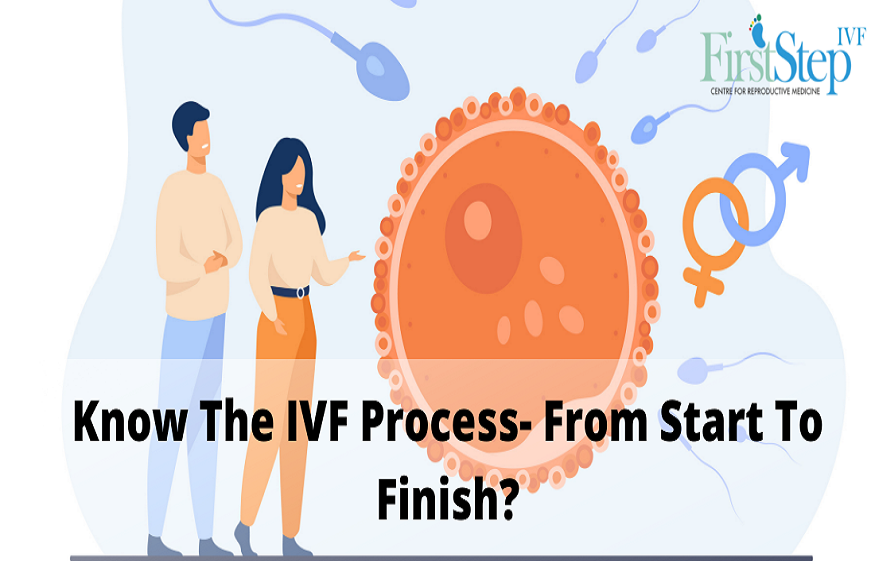Know The IVF Process- From Start To Finish?

More and more couples who struggle with infertility are finally getting a sigh of relief thanks to IVF and other assisted reproductive technology, which gives them the opportunity to start a family. In spite of the widespread use of in vitro fertilization, it is still a process poorly understood by many.
Before commencing further, it is important to know that every individual has a completely unique experience regarding the IVF process. Every individual going through the IVF process can get several complications and may face various challenges different from others. Additionally, every clinic follows different protocols depending on the situation of the individual.
1. Initial consultation
The woman will have undergone a complete examination of her fertility and possibly diagnose the major problems. Before the commencement of the IVF process, she will probably have a consultation session at the clinic. Moreover, she will probably be getting a step-by-step demonstration of what her treatment will look like, ensuring that she is fully well informed and comfortable with the process.
2. Hormone Production Suppression
IVF depends on the zygote being brought back from the ovaries when they get matured. The zygotes of a woman develop cysts inside filled with fluid in the ovaries known as follicles, which are stimulated to develop at some stage in the IVF cycle. With the growth of follicles, the estrogen levels increase, thereby causing luteinizing hormone (LH) to surge, which eventually leads to the final maturation and release of the eggs. Therefore, it is crucial to prevent the LH surge in the IVF cycle.
3. Stimulation of Egg Supply
This is the stimulation phase where the woman will be asked to take injections of a fertility hormone called Follicle Stimulating Hormone (FSH) daily, resulting in growing many follicles containing eggs in her ovaries which will then be collected at the clinic. The production of a good quality fetus is improved by a large number of eggs available for fertilization. Apart from this, the clinic will look after the progress of the woman through her treatment. Moreover, blood samples and scans will help in monitoring the follicles’ development.
4. Collection of Egg
When the follicles containing the eggs will obtain the optimal size and the hormones reach an acceptable level, the woman will be administered a final hormone injection at 34-38 hours before the retrieval procedure. The main aim of the injection is to reach the eggs in their final maturation in the follicles and to imitate the natural increase in LH in a normal natural cycle. The “shot” is often provided at late night so that the egg collection can appear at the time programmed in the clinic. However, make sure not to be late for egg collection as if the collection process happens after 40 hours, the eggs may all have been released from the ovary, and the course of treatment should be abandoned.
5. Egg Fertilization and Embryo Development
The collected eggs will be mixed with either the male partner or donor sperm in a lab which will be administered after 16-20 hours if they are fertilized. In some cases, these eggs will require the injection of a single sperm into each egg, the process of which is called Intracytoplasmic Sperm Injection (ICSI). The eggs are then fertilized and become embryos, which, before being transferred, may be developed in the lab for up to six days (however, some clinics may take three days).
6. Fresh Or Frozen Embryos
Here, there will be two different options, namely
Frozen embryo: A frozen embryo transfer is considered the best when patients are found at higher risk of overstimulation or a complication known as Ovarian Hyperstimulation Syndrome (OHSS). The purpose of scheduling frozen embryo transfer in patients with OHSS is to permit ovaries and the lining of the uterus to recover from stimulation and get back to normal. It has been found that the number of frozen embryo transfers has been increased lately, as it assists the clinic to create an optimal uterine environment before implanting, specifically in those considered to be very sensitive to egg stimulation. First step IVF provides best Egg Freezing in Delhi.
Fresh embryo- In a fresh embryo transfer, the best quality embryo which had been developing in the lab over the last few days is transferred into the womb through the cervix in a simple procedure, which can be very effective. However, if the hormonal balance or condition of the lining of the uterus is in question, the clinic may elect to delay the transfer until a later cycle, where they will do their best to ensure appropriate development and receptivity of the uterus lining.
7. Progesterone Supplementation
Some forms of progesterone, in the form of a vaginal pessary, tablet, or injection, are provided to all patients going through the IVF process to support the newly transferred embryo. Frozen embryo transfer patients are usually found to have more progesterone after the transfer. It may take several weeks depending on whether the embryo has been successfully implanted and the pregnancy is in progress.
8. The Final Stage
Now the clinic has done everything possible to give you the best chance of getting pregnant. After two weeks, you will be asked to take a blood pregnancy test to find out if you have achieved pregnancy. However, if you are found pregnant, you will be asked to come for a regular check-up to monitor the embryo development and to continue with progesterone and often other medication that may help to maintain a healthy pregnancy.
To get the best IVF in Delhi, visit the First Step IVF clinic, where you will get assistance from skilled doctors, who take utmost care and accuracy and use the latest technology to complete the IVF process.






